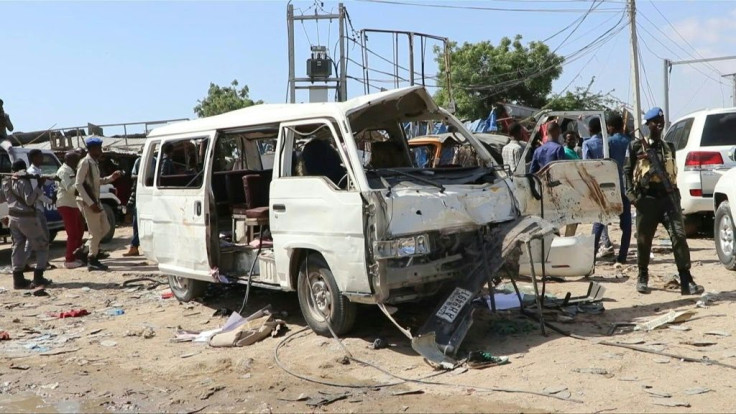Turkish Troops In Somalia: After Terror Attack, Questions Arise About Turkey's Presence In Region

KEY POINTS
- Turkey's largest foreign military base is in Somalia
- The Turks have poured hundreds of millions of dollars in humanitarian aid, infrastructure investment in Somalia
- Critics charge the Turks are trying to revive the once dominant Ottoman Empire
Turkish President Recep Tayyip Erdogan condemned a deadly car bomb terror attack on Saturday that killed at least 80 people, including two Turks, in Mogadishu, Somalia.
"I wish God's mercy upon two Turkish citizens and Somali brothers who lost their lives and speedy recovery for those injured," Erdogan wrote on Twitter. "Turkey always stands by Somalia."
Turkey’s foreign ministry also condemned the terror attack.
“Turkey will resolutely continue to provide support for the immediate establishment of peace and stability in Somalia and to ensure the country has the necessary environment for development,” the ministry said.
A Turkish military cargo plane was dispatched to Mogadishu to carry wounded Somalis to Turkey for treatment, 4,000 miles away.
Turkey has kept a military base in Somalia, now 10,000-men strong, since 2017, making it Ankara’s largest foreign base. The base’s purpose was to protect Somalia from both internal and external enemies, and to train Somali military forces.
After the fall of President Mohamed Siad Barre in 1991, Somalia degenerated into a failed state scarred by violence, poverty, anarchy, civil war and terror attacks by al-Shabab. Not even intervention by U.S. forces could resolve anything.
But in 2011, Erdogan, the leader of an economically resurgent Turkey visited the East African nation. Subsequently, Ankara has poured in hundreds of millions of dollars in military and humanitarian aid.
Turkish companies now operate Mogadishu’s air and seaports while local markets are filled with Turkish goods. Turkish Airways even conducts regular flights to Mogadishu -- the first major foreign carrier to do so. One of Mogadishu’s biggest hospitals is named after Erdogan and one-third of the doctors in the hospital are Turkish. Turkey has also provided thousands of scholarships to Somali students, while the Turks have built dozens of new schools in Mogadishu.
"Somalia has been in a civil war for 30 years. The country has been plundered and all systems have been toppled. Even people's mentality and beliefs were shaken. It has become an ungovernable country. We are here to contribute to the advancement of Somalia in the field of armed forces," said Staff Col. Mehmet Yasin Kalin, the commander of the Turkish military training base. "We are doing our best to help our Somali brothers and sisters in terms of restructuring, equipping and training the Somali armed forces."
At the base, Somali troops are taught the Turkish language and culture.
Col. Abduquadir Ibrahim Isack, the Somali commander of the military academy, praised Turkey’s efforts in his beleaguered country.
"It is training at the international level. We have not been blessed with such an opportunity for the past 27 years," he said. "It is not just a training program. It is a high-quality training program.”
Kalin noted the base also includes Turkish naval and air training personnel.
"The naval training task forces are engaged in training the Somali navy,” he said. “We also help with the maintenance. There are also boats given to the Somali navy. They are trained and equipped by Turkey and have gradually started to patrol off Mogadishu. Somalia does not [currently] have an air force, but God willing, it will be possible in time,” he said.
Other senior Somali officials also praised Turkey’s presence in the country.
"Turkey came to Somalia first in 2011, when no one dared to go to Somalia," said Abdulkadir Ahmed-Kheir Abdi, Somalia's state minister for foreign affairs. "There was a drought, there was a famine, there [were] terrorist activities there, and everyone stayed away. So for us as Somalis, Turkey is in our heart because of the help they provide in the time of need.”
However, Turkey’s designs in East Africa have raised alarms in the Middle East -- some critics charge the Turks are in an expansionist mode in the region, harkening back to the Ottoman Empire which, at its peak, ruled much of the Middle East, North Africa and parts of Eastern Europe.
Crown Prince Mohammad bin Salman of Saudi Arabia even criticized Turkey for trying to revive an “Ottoman caliphate” in East Africa.
But Kalin rejected notions that Turkey is engaged in any kind of colonialism in Somalia.
"Security will usher in stability. Turkey is sowing the seeds of it now," he noted. "As long as the people of Somalia need us and we are able to meet their needs, I think we will be here.”
Winston Otero of Brown Political Review wrote that Turkey “not only helps Somalia recover from the injuries of civil war, but also creates an economic foundation to secure Somalia’s future. This developmental aid is especially prominent in infrastructure, education and trade agreements.”
Otero added that while Somalia seems to be benefitting from Turkish development aid, Turkey benefits from new trade agreements for much needed natural resources and from opening Somali markets to Turkish commodities.
“Somalia is one of the largest importers of Turkish goods and services such as raw construction materials, medical equipment, domestic appliances, education development and engineering consulting,” Otero wrote. “For Turkey, Somalia is an untapped market for business enterprise, humanitarian and developmental aid, and government-aided political restructuring. Turkey’s investment in Somalia has paid off and solidified Turkey’s position in Africa, a region previously seen to be outside of its sphere of geopolitical influence.”
© Copyright IBTimes 2025. All rights reserved.





















